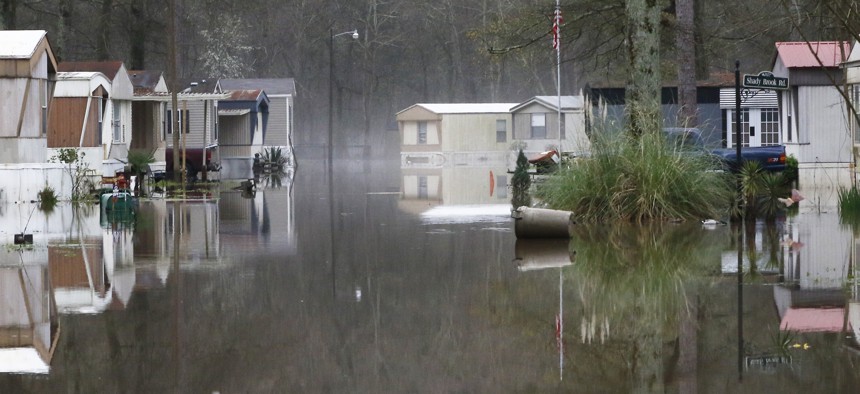Mid-Sized City Mayors Urge Feds Not to Forget Them in Climate Fight

Standing floodwater from the Pearl River still surrounds a number of mobile homes in the back portion of the Harbor Pines community in Ridgeland, Miss., Tuesday, Feb. 18, 2020. AP Photo/Rogelio V. Solis
The type of infrastructure investment needed to advance the Biden administration’s climate policy goals could be out of reach for many small and mid-sized cities without federal help.
Combating climate change is a top priority for the Biden administration, with the president outlining a range of plans and policies meant to reduce carbon emissions and build out infrastructure that can better handle severe weather and rising seas.
But city mayors who embrace the focus on renewable energy and resilient public works have a message for federal officials: don’t forget the little guys.
Small and mid-sized cities need opportunities to address climate change in their communities just as much as large urban areas, the mayors of two cities stressed during a National League of Cities panel discussion Tuesday.
In Boise, Idaho, which expects to dramatically alter the way the city manages its water resources, Mayor Lauren McLean said billions of dollars in investment will be needed over the next several decades for clean and resilient water infrastructure.
“We need to invest in innovation and infrastructure,” McLean said as she spoke on the NLC panel.
Yet Boise, with a population of about 230,000 people, has faced difficulty competing for federal grants because of its size and resources, McLean said.
Looking for “shovel worthy” local projects rather than those that are completely shovel-ready could help smaller cities compete, she said.
Errick Simmons, the mayor of Greenville, Mississippi, expressed a similar desire for federal aid to be delivered at the local level.
“We need a full federal response that is going to help small- and medium-sized cities in America,” he said.
Flooding is a concern for Greenville, a city of about 30,000 residents, which sits next to the Mississippi River. Recent winter storms also exposed vulnerabilities in the region’s water system and led to widespread drinking water outages or boil orders.
Last year, Greenville received a $7.7 million federal grant to make sanitary sewer infrastructure improvements meant to handle future flooding and also provide the capacity for new business growth. The grant was matched by $8.6 million in local investments. But neighboring towns have 400 or 500 residents and no way to come up with that kind of money for a match, Simmons said.
“When I listen to my neighbors around me, they really need help,” he said. “Climate hits us all hard.”
Federal grants and low interest loans could be used in the region to help small towns to build sustainable infrastructure that can protect low-lying regions from flooding, hurricanes and other natural disasters, Simmons said.
“It will protect communities like mine and save the federal government money in the long run,” he added.
President Biden took immediate action on climate change initiatives on his first day in office. He has also appointed former Environmental Protection Agency chief Gina McCarthy as a national climate adviser and tasked her with coordinating the federal government’s domestic climate agenda.
McLean expects that having a willing partner in the federal government on climate issues will create opportunity both for investment and innovation.
Victoria Arroyo, an associate administrator in the EPA’s Office of Policy, said the administration’s climate task force will take a whole-of-government approach.
“Part of what we need to do at the federal level is to look at all the money we give and try to align that with building resilience,” Arroyo said.
Andrea Noble is a staff correspondent with Route Fifty.
NEXT STORY: If Your State is Struggling With the Vaccine Rollout, This Is Probably Why





